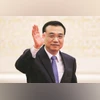Li Keqiang, who stepped down as Chinese premier earlier this year after a 10-year stint, died of a heart attack on Friday. Li belonged to the generation of Chinese Communist Party technocrats who, in the aftermath of the disastrous Cultural Revolution (1966-76), helmed China’s economic recovery and the reform and liberalisation programme led by Deng Xiaoping. This phase saw the party take on a supervisory role, rather than an executive one. The private sector and market mechanisms were embraced, party leadership positions were limited in tenure, and collective leadership was emphasised over the personalised power characteristic of the Maoist era.
Li Keqiang’s term as premier coincided with the first 10 years of Xi Jinping’s reign as China’s president and top party leader. However, during this period, the State Council headed by the premier, who is also no. 2 in the leadership hierarchy, progressively diminished in authority. It is central party committees, each headed by Xi himself, which formulate policies and oversee implementation, rather than the State Council. The role of the premier has never been as diminished as it became during Li’s tenure.
Li was also out of step with the re-orientation of China’s economic strategy under Xi. The space for the private sector was progressively narrowed, while state-owned enterprises saw a revival as champions of China’s quest for technological and resource self-reliance. Li also considered as premature Xi’s declaration of China’s emergence as a moderately developed state, well on the road to developed country status. In a speech towards the end of his tenure, he pointed out that despite its economic achievements, China still had 600 million of its citizens who earned barely 1,000 yuan ($130) a month. During the Covid pandemic, when Xi imposed a prolonged and total lockdown, Li called for a more relaxed regime, pointing to the need to maintain the tempo of economic activities. These occasional displays of dissent had no traction.
Li enjoyed a reputation for being an accomplished and pragmatic economic manager. He came from a humble background, and like several of his contemporaries, served time doing manual labour in the countryside during the Cultural Revolution. He was later able to study at university and obtained a PhD in economics. While serving as party secretary in Liaoning province in northern China, he is reported to have told a visiting American ambassador that he did not believe the official, “man-made” statistics released by authorities, and that he was better able to assess the economic performance of his province by keeping tabs on three indices —volume of railway cargo, electricity consumption, and loans disbursed by banks. These together became known as the “Li Keqiang Index”.
Like the country’s politics and economy, Xi Jinping has also dominated China’s external relations. Xi worked through trusted aides like State Councillor Yang Jiechi and later Wang Yi rather than through his premier. In relations with India, too, it is Xi who called the shots. During Prime Minister Modi’s visit to Xian in China in 2015, Xi reportedly avoided responding to Modi’s bold proposal that the two leaders should seek a political settlement of the border issue between themselves. Xi countered by saying that Li Keqiang would address the issue in his meeting with Modi later in Beijing. Apparently, Li did nothing more than merely repeat China’s standard formulation that this was an issue left over from history and would take time to resolve.
Li Keqiang will not be missed, but the death of any senior leader in China is always a sensitive event. Sometimes the mourning over a departed leader becomes a means of obliquely criticising the current leader. This is what happened with disgraced party leader Hu Yaobang, whose death in 1989 was followed by public mourning, which later culminated into anti-regime riots in the capital’s Tiananmen Square. There has been an outpouring of condolences and praise on Li’s death in Chinese social media. If this goes beyond a point, the censors will step in. Li may be more of a rival to Xi in death than he ever could be in life.
More From This Section
(Shyam Saran is a former foreign secretary and an honorary fellow at CPR)

)
